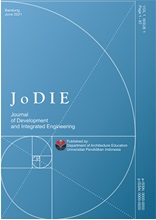GENERIC STRATEGY STUDY IN HOTEL DESIGN IN THE NEW NORMAL ERA. CASE STUDY: URBAN INDEPENDENT HOTEL
Abstract
The new normal era has had an impact on the decline of the economy and tourism in the city of Bandung. This condition has an impact on the regional income of the City of Bandung due to restrictions on foreign and domestic tourists. The decline in hotel occupancy is due to the lack of tourist visits. Hoteliers experience difficulties in maintaining their business due to the lack of discussion on this matter. Therefore, the designer's perspective can be a reference for managers and decision-makers to develop the hotel business efficiently during a pandemic. This study uses a descriptive analysis method from Hotel Urban Merdeka as a case study, which was able to survive during a pandemic. This research shows that generic strategies in hotel design are very important to attract and retain customers in the new normal era. Therefore, it is important for hotel owners to consider generic strategies, such as low cost, differentiation, and focus on certain market segments. Hotels that are responsive to changing trends and consumer preferences will be more successful in the new normal era. Factors such as hygiene, health, and safety are factors that must be considered. Different design concepts, such as eco-friendly designs or designs with artistic and cultural concepts added value to hotels and attract consumers' attention. The implication of this research is that hotel owners must consider generic strategies in their hotel designs and always be responsive to changing trends and consumer preferences. In addition, different design concepts must also be considered to provide added value to hotels and attract consumers' attention.
Keywords: Tourism, repositioning, construction scenario, low cost
Full Text:
PDFReferences
Anggarini, DT (2021). Efforts to restore the tourism industry in the Covid-19 pandemic situation. Journal of Tourism, 8(1), 22-31
Ardani, EG, & Harianto, A. (2021). Surviving strategy of the hospitality sector in a pandemic situation: case of hospitality business in Jakarta. E-Journal of Tourism., 8(1), 77-86.
Dwina, I. (2020). The weakening of Indonesia's economy in the tourism sector, due to the impact of the co-19 pandemic.
David, FR (2011). Strategic management concepts and cases. Prentice hall.
Ertac, M., & Cankan, E. (2021). Creating a sustainable tourism model in North Cyprus during the uncertainty of the Covid-19 pandemic. Worldwide Hospitality and Tourism Themes, 13(4), 488-497.
Hendriyati, L., & Santoso, IB (2021). Food and Beverage Marketing Strategy to Increase Sales During the Covid-19 Pandemic at Cavinton Hotel Yogyakarta, Indonesia. Journal of Tourism and Economics, 4(1), 60-72.
Herawati, T., Setyawan, H., & Syah, F. (2022). Bandung Kollektiv Hotel Marketing Strategy During the Covid-19 Pandemic. Epigrams, 19(1), 90-97.
Kumar, PB (2022). SURVIVAL STRATEGIES OF TOURISM INDUSTRY IN TIMES OF COVID-19 PANDEMIC: A STUDY OF SELECTED TOURIST ENTERPRISES IN KERALA. Revista de tourism-study the cercetari in tourism, (33).
Ncube, FN, Chikuta, O., Basera, V., Baipai, R., Mazhande, P., & Tapfuma, M. (2021). ECONOMIC IMPACTS OF THE COVID-19 Pandemic On The Hotel Business In Zimbabwe. Journal Of Tourism, Culinary And Entrepreneurship (JTCE), 1(2), 105-121.
Makhasi, GYM, & Chasanah, U. (2018). Competitive Strategy Of Desa Puri Syariah Hotel In The Contest Of Halal Accommodation Service In Yogyakarta. Journal of Applied Business, 2(02), 117-132.
Pambudi, AS, Masteriarsa, MF, Wibowo, ADC, Amaliyah, I., & Ardana, AK (2020). Post-Covid-19 tourism sector economic recovery strategy. Planning Media Magazine, 1(1), 1-21.
Pangaribuan, NP, & Ibrahim, M. (2015). Implementation of Product Differentiation Strategy at Mona Plaza Hotel Pekanbaru. Student Online Journal (JOM) in Social and Political Sciences, 2(2), 1-9.
Purike, E. (2021). Constraints and Impact of the Covid-19 Pandemic on the Tourism and Hospitality Sector in the City of Bandung. Cross-border, 4(2), 566-580.
Permana, A. Y., & Wijaya, K. (2017). Spatial change transformation of educational areas in Bandung. IOP Conference Series: Earth and Environmental Science, 99, 012029. https://doi.org/10.1088/1755-1315/99/1/012029
Puspita, NPLA, Astawa, IP, & Mudana, IG (2021). Hotel Strategy in Facing the Covid-19 Pandemic (The Westin Resort Nusa Dua Experience). International Journal of Glocal Tourism, 2(1), 28-39.
Rogerson, JM, Lekgau, RJ, Mashapa, MM, & Rogerson, CM (2021). Covid-19 and local business responses: Evidence from South Africa's most tourism-dependent locality. African Journal of Hospitality, Tourism and Leisure, 10(1), 388-405.
Salim, MVT, Satrya, I., & Anshori, MY (2021). Primebiz Hotel Surabaya Business Strategy in Facing the Covid-19 Pandemic. MEETING: Journal of the Master of Tourism, 8(1), 192-212.
Supriatna, E. (2020). Socio-economic impacts of the COVID-19 pandemic: the case of Bandung City. Journal of Governance, 5(1), 61-70.
Syaifudin, R., Desmawan, D., & Setyadi, S. (2021). Hotel Branding Strategy Due to the Covid-19 Pandemic Case Studies in Four and Five Star Hotels in Banten Province. Valuation: Scientific Journal of Management and Entrepreneurship, 1(1), 243-257.
Utami, BA, & Kafabih, A. (2021). Indonesia's tourism sector in the midst of the COVID 19 pandemic. JDEP (Journal of Development Economic Dynamics), 4(1), 8-14.
Wahyuni, MI, & Ambarriani, USA (2019). Implementation of Quality Management in Non-Star Hotels in the City of Yogyakarta. Mode, 31(1), 61-71.
Wahyuni, H., Purnomo, EP, & Fathani, AT (2021). Social media supports tourism development in the normal COVID-19 era in Bandung. Journal of Communication Studies, 5(3), 600-616.
DOI: https://doi.org/10.17509/jodie.v2i2.55739
Refbacks
- There are currently no refbacks.
Copyright (c) 2022 Tecky Hendrarto

This work is licensed under a Creative Commons Attribution-NonCommercial-ShareAlike 4.0 International License.

This work is licensed under a Creative Commons Attribution-ShareAlike 4.0 International License.








